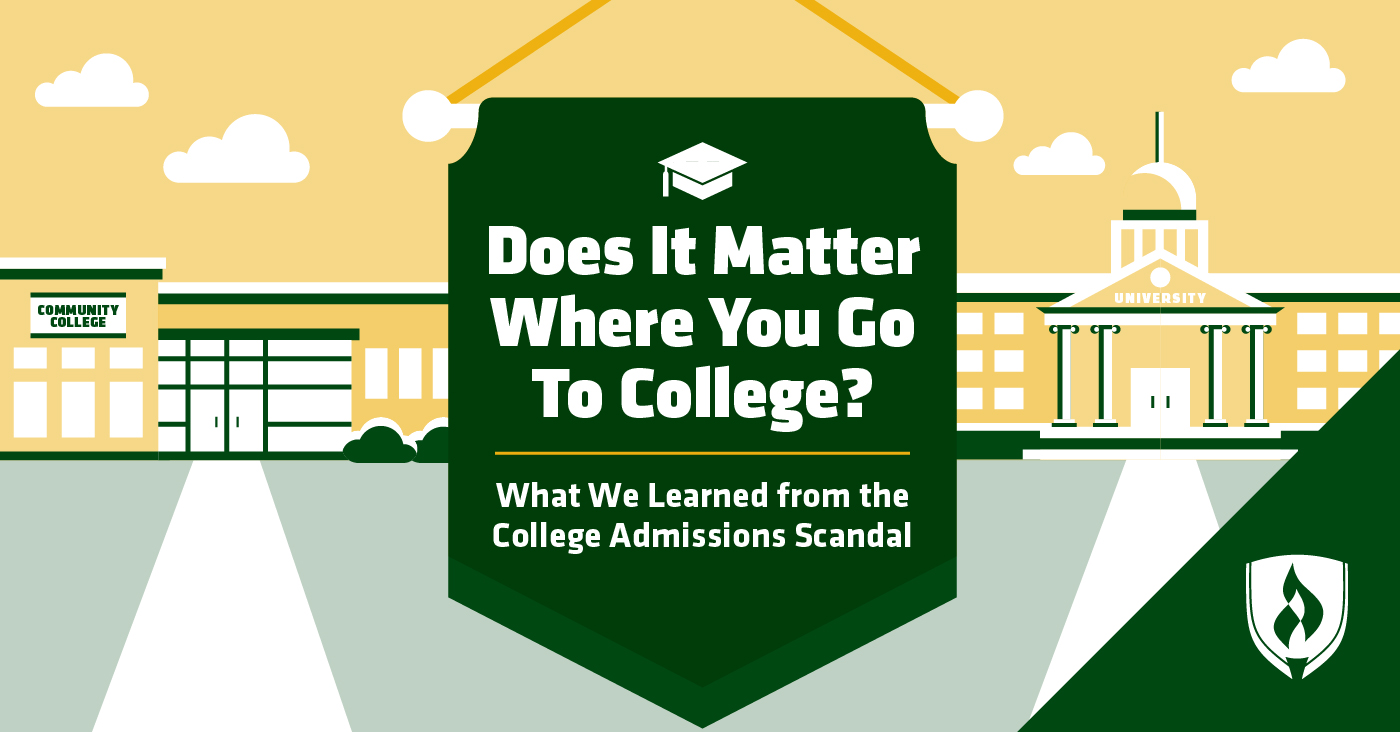Does It Matter Where You Go to College? What We Learned from the College Admissions Scandal
By Jess Scherman on 05/20/2019
In early 2019, the world of elite college admissions was rocked in the wake of Operation Varsity Blues, a headline-catching investigation of the unethical—and criminal—acts committed by wealthy families and their advisors to ensure students’ placement at top-tier universities. The scandalous scheme involved college administrators, Division I athletics coaches, standardized exam proctors and more. Among the charged are more than 30 wealthy parents—from CEOs and other high-ranking executives to well-known, A-list celebrities.

At least 50 people took part in the multilayered scheme, which involved orchestrated cheating on standardized tests along with the bribing of coaches and other school officials to accept non-athlete students as athletic prospects. The goal of these unethical and illegal efforts was, of course, to ensure that the children of the well-to-do parents footing the outlandish bill—reportedly ranging from $15,000 to $500,000—would be accepted to some of the nation’s most elite universities.
Obviously this is a juicy story with a lot of angles to potentially catch your attention with, but there’s more to consider here than just an opportunity to gawk at an embarrassing situation for several well-to-do families. Witnessing people go to such lengths to ensure Ivy League status for their children may leave you wondering, “Does it matter where you go to college?” We dug into the data and interviewed a handful of experts to uncover the truth about the importance of college pedigree.
Are elite colleges worth it?
If the college admissions scandal taught us anything, it’s that some families will risk everything to ensure their children get a perceived leg up, and those without ample funds are often at a disadvantage. These families’ motivations stem from one undeniable truth—entry to the most prestigious higher education institutions in the U.S. is hard to achieve.
Of the millions of Americans applying to college each year, there are hundreds of thousands who set their sights on elite, “brand name” institutions. USA Today reports that for the 2017-18 academic year, more than 280,000 students applied to the eight Ivy League colleges in the country, with less than 10 percent receiving official offers to attend.1
Admissions scandal-related schemes aside, American families are spending big bucks on expensive test prep and tutoring opportunities in the hopes of boosting their children’s Ivy League chances. But the financial challenges don’t ease up once a student gains admittance. Tuition at a top-tier institution can cost anywhere from $50,000 to $70,000 per year.
The steep competition and high costs lead many to wonder whether all this is actually worth the cost and effort. While it’s true graduates from elite schools often have higher incomes than the general public, the causation is much more complex than just the name of the school these students attend. Some of the success of these elite universities’ students can be explained by the expanded networks of the wealthy families whose children make up a large percentage of the student population—it’s considerably easier to land a well-paid job if you have family or friends in influential places to vouch for you. It’s also worth considering whether the types of high-achieving students who are vying for admission into these schools would be successful regardless of the institution they attend.
Studies conducted with this in mind have concluded that if two students scored similarly on the SAT, but one attends an Ivy League school while the other attends a lesser known state school, their difference in earning potential later in life is “indistinguishable from zero.”2 All of this is to suggest that the knowledge, skills and ambitions of individual students carry more weight than the pedigree of the college they choose to attend.
That said, the question of whether or not graduating from an elite school matters may depend on the employer. Top-tier institutions are at times referred to as “feeder schools,” as they are viewed by some top firms and companies as direct sources for qualified, entry-level job candidates. The University of Pennsylvania, for example, is considered a primary feeder school for top companies in the finance sector, including organizations like Goldman Sachs and Morgan Stanley.
On the flip side, executives at top tech companies like Google maintain that their experiences have taught them the relationship between where an employee went to school and how well they perform in their job is nonexistent. Gallup Poll findings support this notion, with a majority of surveyed business owners reporting that elements like a candidate’s knowledge of their field and applicable skills greatly outrank college pedigree in their hiring standards.3
What the experts say about choosing the right college
The research conducted on the impact of a student’s choice of college speaks for itself, but it’s also helpful to consider the thoughts of experts in the areas of admissions, educational consulting and career success.
Michael Outar is the founder of Savebly.com, where he authors content that provides college students with a wealth of financial literacy and career tips. Through his work, he’s learned that there are perceived advantages to attending a prestigious top-tier school, but that prestige can only take you so far.
“The college admissions scandal exposed the extreme lengths parents will go to get their children into elite colleges for the best education ‘money can buy,’” Outar notes. “Having these prestigious colleges on your resume will definitely put you on top of the list, but it doesn’t mean that you are the best candidate for the job.” What really matters, he adds, is that you received the education required to do your job efficiently and effectively.
“This scandal underscores the concern parents have [regarding] their kids’ long-term success. Many feel that admission to an elite university ensures it,” explains Greg Kaplan, founder of the Artis College Admissions app and author of Earning Admission: Real Strategies for Getting into Highly Selective Colleges. “Through my work, I see that students who have a clear-cut passion find easier ways to achieve their goals.”
Yelena Shuster has dedicated her career to educational consulting as The Admissions Essay Guru. An Ivy League graduate herself, she’s learned firsthand how a diploma from a top-tier institution can (or can’t) open doors for young professionals. “Some of the more name-brand colleges might make it easier for you to land prestigious internships and jobs in certain fields, but they in no way claim all the spots,” she says.
That said, now that she’s in her 30s, she maintains that college pedigree may not be as important as many think. “I know plenty of successful people who didn’t go to an Ivy League school and are more ‘successful’ than many of my [former] classmates,” Shuster offers. “No college status will ever replace hard work and initiative.”
Gear up for your own college search
While the college admissions scandal has people across the country reeling and considering the value of their own current or potential college degrees, we’ve learned that elite college status may be less important than it might seem on the surface. Success in many cases is less about getting accepted to the college that will look most impressive on paper, and more about finding a school that will fit your career goals and personal learning style.
In embarking upon your own college search, it can be important to maintain a firm grasp on what you’re looking for out of a school. A great way to evaluate the best fit for you is to speak with the college admissions representatives at the schools you’re scoping out. To prepare yourself for those conversations, visit our article “10 Questions to Ask College Admissions Representatives.”
1USA Today, Here’s What It Really Takes to Get into the Ivy League These Days, [accessed April 16, 2019] https://www.usatoday.com/story/college/2017/04/26/heres-what-it-really-takes-to-get-into-the-ivy-league-these-days/37430681/
2National Bureau of Economic Research, Estimating the Return to College Selectivity Over the Career Using Administrative Earnings Data, [accessed April 16, 2019] https://www.nber.org/papers/w17159
3Gallup, Business Leaders Say Knowledge Trumps Pedigree, [accessed April 2019] https://news.gallup.com/poll/167546/business-leaders-say-knowledge-trumps-college-pedigree.aspx




